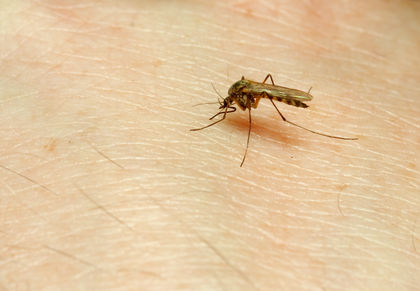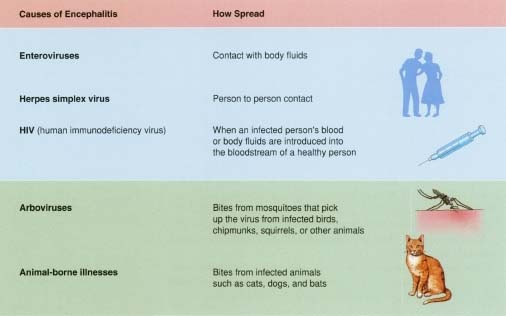Encephalitis

Encephalitis (en-seh-fuh-LYE-tis) is inflammation of the brain.
KEYWORDS
for searching the Internet and other reference sources
Arboviruses
Herpes simplex virus
Immunizations
La Crosse encephalitis
Meningitis
Mosquito-borne illnesses
St. Louis encephalitis
Tick-borne illnesses
West Nile virus
What Is Encephalitis?
There are several different causes of encephalitis. The most common is infection, usually by a virus. The condition can range from mild to severe, depending on the type of germ producing the infection. Encephalitis can occur with certain childhood viral illnesses, such as mumps, measles, varicella (chicken pox), rubella (German measles), or mononucleosis.
A much more serious type of encephalitis is caused by the herpes simplex virus * (HSV). HSV rarely infects the brain, but when it does, it can be life threatening. West Nile virus, which first arrived in the United States from other parts of the world in the late 1990s, can cause encephalitis as well. Infected birds carry this virus, but mosquitoes can pick up the virus when they bite infected birds and then spread the virus to humans through a bite.
Encephalitis may develop in a person who has meningitis (meh-nin-JY-tis), an inflammation of the membranes surrounding the brain and spinal cord, called the meninges (meh-NIN-jeez). It also can be a complication of other infectious diseases, such as rabies, cytomegalovirus * infection, listeriosis * , syphilis * , or Lyme disease. In people with a weakened immune system, for instance, those with HIV/AIDS, infection by parasites can lead to encephalitis, especially the parasite that causes toxoplasmosis * .
How Common Is Encephalitis?
Each year, several thousand cases of encephalitis are reported to the U.S. Centers for Disease Control and Prevention. Health officials believe that many more cases go unreported when the symptoms are mild.
Is the Disease Contagious?
Although the brain inflammation itself is not contagious, viruses that cause encephalitis may be contagious. When someone contracts the same virus that a person with encephalitis has, however, it does not mean that he or she also will develop encephalitis.
* herpes simplex (HER-peez SIM-plex) virus is a virus that ca n cause infections of the skin, mouth, genitals, and other parts of the body.
* cytomegalovirus (sy-tuh-MEHguh-lo-vy-rus), or CMV, infection is very common and usually causes no symptoms. It poses little risk for healthy people, but it can lead to serious illness in people with weak immune systems.
* listeriosis (lis-teer-e-O-sis) is a bacterial infection that can cause a form of meningitis in infants and other symptoms in children and adults.
* syphilis (SIH-fih-lis) is a sexually transmitted disease that, if untreated, can lead to serious lifelong problems throughout the body, including blindness and paralysis.
* toxoplasmosis (tox-o-plaz-MO-sis) is a parasitic infection that usually causes no symptoms in healthy people, but it can cause serious problems in unborn babies and people with weak immune systems.
* mucus (MYOO-kus) is a thick, slippery substance that lines the insides of many body parts.
How Is Encephalitis Spread?
Because several different germs can cause encephalitis, spread of the infection may take place in different ways. For example, mosquitoes transmit viruses that cause West Nile encephalitis, St. Louis encephalitis, and western equine encephalitis. Other viruses (such as herpes simplex virus or varicella-zoster, var-uh-SEH-luh ZOS-ter, virus, which causes chicken pox) are spread in fluids from the mouth, throat, or nose; tiny drops of these fluids, such as saliva and nasal mucus * , may be sprayed into the air

What Are the Signs and Symptoms?
Many people who are infected with a virus that can cause encephalitis have only mild symptoms. Symptoms in people who develop encephalitis may appear suddenly and include headache, fever, sensitivity to light, loss of appetite, and a stiff neck and back. In more serious cases there may be high fever, nausea (NAW-zee-uh), vomiting, confusion, double vision * , personality changes, problems with hearing and speech, hallucinations * , sleepiness, clumsiness, muscle weakness, loss of sensation, and irritability. In the most severe cases, seizures * and loss of consciousness may occur. A person who has any of these symptoms requires immediate medical attention.
* double vision is a vision problem in which a person sees two images of a single object.
* hallucinations (ha-loo-sin-AY-shuns) occur when a person sees or hears things that are not really there. Hallucinations can result from nervous system abnormalities, mental disorders, or the use of certain drugs.
* seizures (SEE-zhurs) are sudden bursts of disorganized electrical activity that interrupt the normal functioning of the brain, often leading to uncontrolled movements in the body and sometimes a temporary change in consciousness.
How Do Doctors Make the Diagnosis?
Doctors use several tests to diagnose encephalitis. Imaging tests, such as computerized tomography * scans or magnetic resonance imaging * , provide special views of the brain that allow doctors to check for swelling, bleeding, or other abnormalities. An electroencephalogram (e-lek-tro-en-SEF-a-loh-gram), which measures brain electrical activity, will show abnormal patterns in a person with encephalitis. Doctors also might order blood tests to look for the microorganism in the blood and tests that can tell whether the person's body is producing antibodies * in response to a specific virus or bacterium. A spinal tap, also called a lumbar puncture, often is performed. In this procedure a needle is inserted into the lower end of the spine and a small sample of cerebrospinal (seh-ree-bro-SPY-nuhl) fluid, which surrounds the brain and spinal cord, is removed. This fluid is examined under a microscope and tested for signs of infection. In addition, cotton swabs can be used to take fluid samples from the nose, throat, and rectum * to test for certain viruses that might be causing the infection.
How Do Doctors Treat Encephalitis?
Encephalitis is a very serious disease that can be life threatening. Although very mild cases can be treated at home, it is often necessary for patients to be hospitalized. Patients usually are admitted to an intensive care unit, where doctors carefully monitor blood pressure, heart rate, and ability to breathe. Such patients may require a ventilator (VEN-tuh-lay-ter), a machine that does the breathing for very ill people until they can breathe on their own again. Doctors also monitor the body fluids to help prevent or control swelling of the brain, which can lead to a dangerous increase in the pressure within the skull.
Several medications may be given to people with encephalitis. Over-the-counter medicines such as acetaminophen (uh-SEE-teh-MIH-noh-fen) may be used to treat minor symptoms such as fever and headache. Antiviral medications sometimes can help prevent the spread of the virus and are very important in the treatment of encephalitis caused by herpes simplex virus. If a patient is having seizures, anticonvulsants * may help control them. Anti-inflammatory medications called corticosteroids (kor-tih-ko-STIR-oyds) may lessen swelling in the brain.
How Long Does the Illness Last?
The acute phase of the disease, the time when symptoms are most severe, usually lasts up to a week. Full recovery can take much longer, often several weeks or months.
* computerized tomography (kom-PYOO-ter-lzed toe-MAH-gruh-fee), or CT, also called computerized axial tomography (CAT), is a technique in which a machine takes many X rays of the body to create a three-dimensional picture.
* magnetic resonance imaging (MRI) uses magnetic waves, instead of X rays, to scan the body and produce detailed pictures of the body's structures.
* antibodies (AN-tih-bah-deez) are protein molecules produced by the body's immune system to help fight specific infections caused by microorganisms, such as bacteria and viruses.
* rectum is the final portion of the large intestine, connecting the colon to the anus.
* anticonvulsants (an-tie-kon-VUL-sents) are medications that affect the electrical activity in the brain and are given to prevent or stop seizures.
* paralysis (pah-RAH-luh-sis) is the loss or impairment of the ability to move some part of the body.
* coma (KO-ma) is an unconscious state in which a person cannot be awakened and cannot move, see, speak, or hear.
What Are the Complications?
Most people recover from encephalitis completely. For some people, however, swelling of the brain may lead to permanent brain damage. These patients may face long-term complications, such as learning disabilities, seizures, speech problems, memory loss, lack of muscle control, paralysis * , or coma * . In the rare cases where brain damage is severe, death can result. Infants younger than 1 year and adults older than 55 have the greatest risk of permanent brain damage and death from encephalitis.
Causes of Encephalitis
Encephaliti s may be caused by a variety of viruses, bacteria, and other organisms. These agents include:.
- Measles, chicken pox, rubella (German measles), mumps, polio, and other viral illnesses, which generally lead to a mild form of encephalitis known as postinfectious or para-infctious encephalitis.
- Enteroviruses (cn-tuh-ro-VY-ruh-sez), viruses that typically infect the intestines and then may spread to other parts of the body, including the brain.
- Herpes simplex virus, a virus that can infect the mouth, skin, and other parts of the body
- HIV (human immunodeficiency virus), the virus that causes AIDS (acquired immunodeficiency syndrome) and is transmitted when an infected person's blood or b fluids are introduced into the bloodstream of a healthy person.
- Arboviruses (ar-buh-VYruh-sez), which multiply in and are transmitted by blood-sucking insects (such as ticks and mosquitoes) when they bite infected birds, rodents (chipmunks and squirrels, for example) and other small animals and then bite humans.
- Animal-borne illnesses, such as rabies, toxoplasmosis, cat scratch disease, and Lyme disease, that are transmitted to humans by contact with an infected animal's saliva (through a bite or lick, for example), contact with an infected animal's feces (FEE-seez, or bowel movements), or an insect that bites an infected animal and then bites a person.
How Is Encephalitis Prevented?
Some of the viral infections that can cause encephalitis, including measles, mumps, and chicken pox, can be prevented with vaccines given in childhood. To prevent encephalitis caused by West Nile virus or other viruses transmitted by mosquitoes, people are encouraged to avoid being outside at dawn and dusk, when mosquitoes are most active. If they do go out, they are advised to wear light-colored, long-sleeved shirts and long pants and to use insect repellent. Mosquitoes breed in places where there is standing water, such as in buckets, birdbaths, and flower pots, so draining these containers frequently can help control the mosquito population and decrease the risk of infection.
Resources
Organization
U.S. Centers for Disease Control and Prevention (CDC), 1600 Clifton
Road, Atlanta, GA 30333. The CDC provides fact sheets and other
information on encephalitis at its website.
Telephone 800-311-3435
http://www.cdc.gov
Website
KidsHealth.org
. KidsHealth is a website created by the medical experts of the Nemours
Foundation and is devoted to issues of children's health. It
contains articles on a variety of health topics, including encephalitis.
http://www.KidsHealth.org
Comment about this article, ask questions, or add new information about this topic: